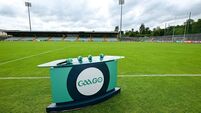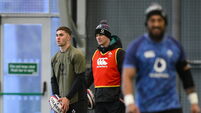Tomas Quinn: Even in low gear, Dublin heed the universal principles

Fans are enjoying the entertainment but it’s also a time for coaches and managers to see new ideas and concepts in use by other teams in other sports that might benefit their own sides.
As with many aspects of life, sport is often a copycat world, where the market leader is analysed by those chasing to see if they can take anything to close the gap.
The challenge for coaches looking to learn is to make sure the ideas copied match the skillset of their own players. We have seen many teams look to ape the ‘Donegal system’ in recent years but few have the personnel or the application required to match what Jim McGuinness and his players spent countless hours rehearsing and evolving.
Let’s look at some of the benchmark teams in sport in recent years. What is the key common trait of Brian Cody’s Kilkenny teams, Pep Guardiola’s Barcelona teams and Jim Gavin’s Dublin teams?
All three teams are considered among the most skillful and dynamic attacking teams we’ve seen. All three include star players as good as any other player of their generations (Messi, Iniesta, Shefflin, JJ Delaney, Cluxton, Connolly etc. And all three have been ruthless in punishing teams who show weakness against them.
And the most common trait I associate with those three teams is the raw willingness to work as a team when they don’t have the ball. It’s not enough to work hard, on these teams you have to work smart.
Barcelona under Guardiola observed a number of defensive principles when they lost the ball. You can see some of these principles in Gaelic games in recent years.
Barcelona started pressing the instant they lost possession. That is the perfect time to press because the opposing player who has just won the ball is vulnerable. He has had to take his eyes off the game to make his tackle or interception, and he has expended energy. That means he is unsighted, and probably tired. He usually needs two or three seconds to regain his vision of the field. So Barcelona tried to dispossess him before he can give the ball to a better-placed team-mate. The Kilkenny hurlers regularly get turnovers in the opposition half using this system, often leading to goalscoring chances.
If Pep’s Barca hadn’t won the ball back within five seconds of losing it, they retreated and built a compact 10-man wall. It’s hard for any opponent to pass their way through such a small space.
Similarly, if Dublin lose possession in the opposition half and don’t win it back quickly, the forwards look to drop to the 45 to compact themselves before looking to make contact.
While yesterday’s game lacked the intensity of Dublin and Meath games of the past, the Dublin forwards were more physical in tackling the Meath backs than what they were getting in return — apart from a couple of questionable late hits from Meath players.
One perfect example of Dublin dropping to the 45 to condense themselves before tackling came in the sixth minute when Ciarán Kilkenny dropped a shot short. Instead of a corner-forward rushing in aimlessly to the goalkeeper or a corner-back and having the ball popped over him creating a piggy in the middle effect for Meath to exploit, the Dublin forwards retreated to the 45 where the Meath ball carrier ran out of options and Kevin McManamon disposed him in the tackle with Dean Rock recovering the ball. Meath then fouled Rock in a scoring position.
On an evening when they didn’t need to push through all the gears, Dublin still continue to reinforce good habits that they will need for longer spells later in the summer.
The chasing pack know they will need to be creative to really challenge these habits.













